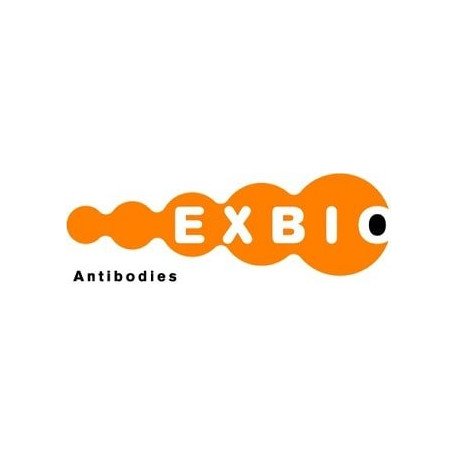Cart 0 Product Products (empty)
No products
To be determined Shipping
0,00 € Total
Prices are tax excluded
Product successfully added to your shopping cart
Quantity
Total
There are 0 items in your cart. There is 1 item in your cart.
Total products (tax excl.)
Total shipping (tax excl.) To be determined
Total (tax excl.)
Data sheet of Mouse Monoclonal to SLP76
| Brand | Exbio |
| Product type | Primary antibodies |
| Reactivity | Mouse, Human, Porcine |
| Clonality | Monoclonal |
More info about Mouse Monoclonal to SLP76
| Brand: | Exbio |
| Product no.: | 11-402-C025 |
| Product type: | Primary antibodies |
| Host species: | Mouse |
| Product name: | Mouse Monoclonal to SLP76 |
| Antigen: | SLP76 |
| Clonality: | Monoclonal |
| Clone: | SLP-76/03 |
| Isotype: | IgG2b |
| Immunogen: | Bacterially expressed fusion protein representing amino acids 216-434 of human SLP76 with histidine tag |
| Format: | purified |
| Specificity: | The polyclonal antibody reacts with SLP76, a 76kDa cytosolic adaptor protein that is involved in signaling of various hematopoietic cells, such as T cells, mast cells or neutrophils; in B cells, however, it is replaced by SLP65. |
| Categories: | Adaptor Proteins (Human), Adaptor Proteins (Veterinary), Adaptor Proteins (Rodent), Adaptor Proteins |
| Concentration: | 1 mg/ml |
| Storage buffer: | Phosphate buffered saline (PBS) with 15 mM sodium azide, approx. pH 7.4 |
| Storage / stability: | Store at 2-8°C. Do not freeze. Do not use after expiration date stamped on vial label. |
| Background: | SLP76 (SH2 domain-containing leukocyte protein of 76 kDa) is a cytosolic adaptor protein which translocates to the plasma mambrane and is involved in multiple signaling pathways in T cells, mast cells, neutrophils and platelets; B cells express its analog SLP65/BLNK (B cell linker protein). SLP76 is phosphorylated by Syk-family and Tec-family tyrosine kinases and couples them to the phosphorylation and activation of PLC-gamma. Via Gads or Grb2, SLP76 also associates with LAT adaptor by involvement of SLP76 proline-rich region. The SH2 domain of SLP76 has been identified as the region involved in binding the serine/threonine kinase HPK1. HPK1 may act as both a positive and a negative regulator by promoting the Jnk-mitogen activated protein kinase (MAPK) pathway and inhibiting the pathway leading to AP-1 activation. |
| Purity: | > 95% (by SDS-PAGE) |
| Purification: | Purified by protein-G affinity chromatography |
| Product specific references: | *Sikorski K, Mehta A, Inngjerdingen M, Thakor F, Kling S, Kalina T, Nyman TA, Stensland ME, Zhou W, de Souza GA, Holden L, Stuchly J, Templin M, Lund-Johansen F: A high-throughput pipeline for validation of antibodies. Nat Methods. 2018 Nov;15(11):909-912. |
| General references: | *Bogin Y, Ainey C, Beach D, Yablonski D: SLP-76 mediates and maintains activation of the Tec family kinase ITK via the T cell antigen receptor-induced association between SLP-76 and ITK. Proc Natl Acad Sci U S A. 2007 Apr 17;104(16):6638-43._x000D_ , *Beach D, Gonen R, Bogin Y, Reischl IG, Yablonski D: Dual role of SLP-76 in mediating T cell receptor-induced activation of phospholipase C-gamma1. J Biol Chem. 2007 Feb 2;282(5):2937-46._x000D_ _x000D_ , *Koretzky GA, Abtahian F, Silverman MA: SLP76 and SLP65: complex regulation of signalling in lymphocytes and beyond. Nat Rev Immunol. 2006 Jan;6(1):67-78._x000D_ _x000D_ _x000D_ , *Silverman MA, Shoag J, Wu J, Koretzky GA: Disruption of SLP-76 interaction with Gads inhibits dynamic clustering of SLP-76 and FcepsilonRI signaling in mast cells. Mol Cell Biol. 2006 Mar;26(5):1826-38._x000D_ _x000D_ _x000D_ , *Pivniouk VI, Martin TR, Lu-Kuo JM, Katz HR, Oettgen HC, Geha RS: SLP-76 deficiency impairs signaling via the high-affinity IgE receptor in mast cells. J Clin Invest. 1999 Jun;103(12):1737-43._x000D_ _x000D_ _x000D_ |
| Related products: | - Mouse Monoclonal to STAT1 - Mouse Monoclonal to SOCS3 / Suppressor of cytokine signaling - Mouse Monoclonal to Sos |
| Shipping condition: | Room temperature |


